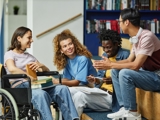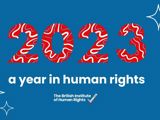An organisation that aims to help those experiencing active addiction and recovery.
Awareness-Raising Workshops 2024: Our Impact
The Baring Foundation have generously funded BIHR’s Community Programme for three years, from 2022 to 2025. The project is to deliver on BIHR’s aim to strengthen the agency and voice of community and voluntary groups to address social justice issues using human rights.
There are six phases in the project cycle, with our awareness-raising workshops being the third phase.
Read more about the Community Programme Awareness-Raising Workshops 2024: Infographic
Our awareness-raising workshops in 2024 consisted of an application-based programme of bespoke, introductory online workshops for up to 20 community and voluntary groups across the UK. Workshops were open to staff and volunteers working in those organisations, as well as to the people they support.
This programme of workshops aims to enable participants to learn about the practical use of the Human Rights Act and how the legal duties and rights work, so they can use this information almost immediately in their lives and work to challenge social injustices and disadvantage they are seeking to change. BIHR’s awareness-raising workshops can often be the beginning of the human rights journey for many of the groups and individuals involved, therefore it is hoped that organisations take the knowledge they have gained forward and work towards building a culture of respect for human rights in their communities.
32
We received applications from 32 vibrant community groups across the UK.
202
We hosted 14 workshops attended by 202 people including staff, volunteers, and people accessing services.
66%
Before coming to a BIHR workshop, 66% of participants told us they had never relied on the Human Rights Act before, or were unsure if they had.
This phase of the project cycle took place between January and April 2024. This involved a far-reaching promotional campaign, a fair and accessible application and selection process, and finally the delivery of online workshops.
All workshops were designed to give participants an introduction to the Human Rights Act including where it came from, the legal duties it puts on public bodies, how it works with other laws, the rights it protects and how they work, and how it can be used to advocate for rights-respecting decisions by public bodies.
In addition to an overview of the legal framework offered by the Human Rights Act, workshops were tailored to suit the diverse needs of the selected community groups. The 14 organisations hailed from England, Scotland and Wales, working on a wide range of issues including:
- Recovery and addiction
- Poverty
- Health and disability
- Domestic abuse
- Migration and asylum
- Romani and Traveller rights
- Old age
Organisations were asked to provide real-life stories from their work which could be explored anonymously using human rights during the workshop.
Four of the workshops were delivered in Easy Read format, and one had BSL interpretation.
The selected community groups were...
Allies for Justice & Families for Justice
Campaign groups for people with lived experience of navigating the UK’s asylum, immigration detention and deportation systems.
Association for Young People’s Health
A charity working to improve the health and wellbeing of 10-25 year olds.
A human rights based anti-poverty organisation.
Awesta Charitable Organisation
A charity advocating for better housing, mental health and education services for refugees, asylum seekers and migrants.
Bristol Reclaiming Independent Living (BRIL)
A campaigning community group run by and for disabled people, neurodivergent people, people living with chronic illness and people who experience mental distress.
Bristol Refugee and Asylum Seeker Partnership
A network of small organisations working to support refugees and asylum seekers locally.
Devon and Cornwall Refugee Support
A charity providing specialist asylum casework support and immigration advice to any asylum seeker or refugee across Devon and Cornwall.
A user-led charitable organisation that supports people with learning disabilities and autism to speak up for themselves.
A charity led and run by people with learning disabilities, with support from staff as needed.
Rochdale Women’s Welfare Association
A charity which serves a diverse community of women facing challenges related to domestic abuse, cultural sensitivity, and immigration status.
A human rights-based campaign and network which believes that people with a learning disability and autistic people should be able to enjoy love, romance and sexual relationships.
An organisation seeking to address ethnic Romani (Gypsy), Roma and Irish Traveller inequality, exclusion and discrimination and promoting their rights.
A community centre in mid-Wales, with a workshop focusing on human rights issues affecting older adults.
After the workshops...
4.3/5
was how people would describe their level of knowledge of UK human rights law compared with 2.8/5 before.
4.1/5
was how people would describe their confidence discussing human rights with public services compared with 3.2/5 before.
100%
said they would recommend a BIHR human rights session.
After the BIHR workshop, how will community groups use human rights in their life or work?
Human rights are a practical tool that people can use in their lives to secure positive outcomes. We asked how the community groups would use their new knowledge of human rights at the end of our workshops. Here are some of the responses:
- I feel like I know how to prepare for a human rights complaint
- By passing on the basics of this information to people in the asylum system
- Campaigning for abolition of detention centres
- Use the fulfil duty to address a recurring issue with the police to stop more women experiencing it
- Put into conversations with statutory services
- Campaigning for asylum seekers’ rights
What's next?
BIHR would like to thank all the organisations across the UK that applied for an awareness-raising workshop, for their commitment to taking a human rights-based approach to supporting their communities. Further thanks go to the 14 small but vibrant community groups that were selected for helping us to develop tailored content, for promoting and coordinating the workshops within their organisations and beyond, and for providing evaluation information, without which we would have been unable to write this report and develop this work for future audiences.
A final thanks goes to the Baring Foundation for funding this important work to empower communities across the UK to use human rights in their campaigning for social justice.
For now, we are continuing with the next phase of our Community Programme 2022-2025 as we co-design a support solution alongside four more community and voluntary groups in order to help them address issues affecting them and the people they support.
Related information
Stay up-to-date
Get our newsletter
Get monthly updates on UK human rights law and our work, resources and events sent straight to your inbox.




